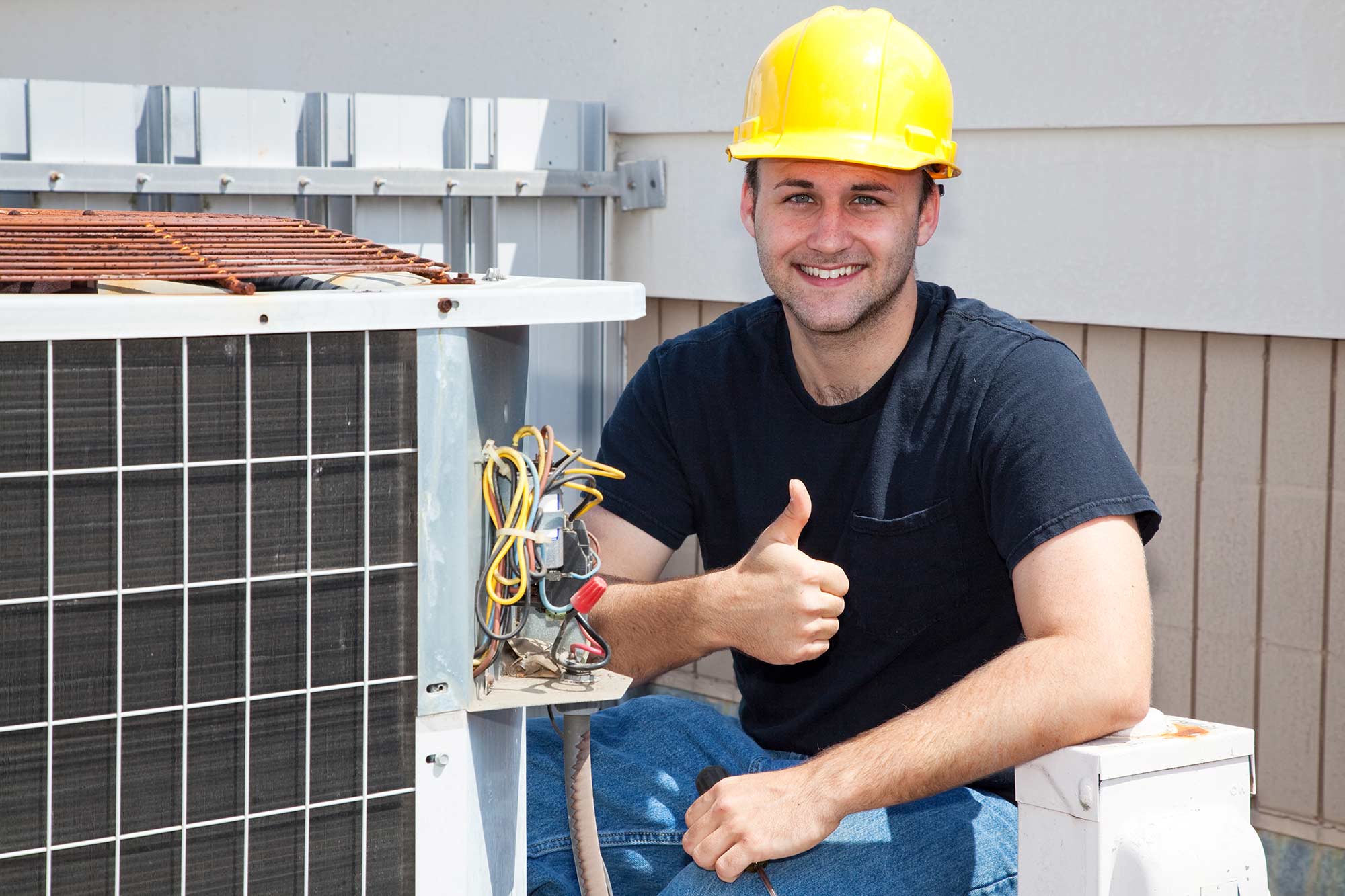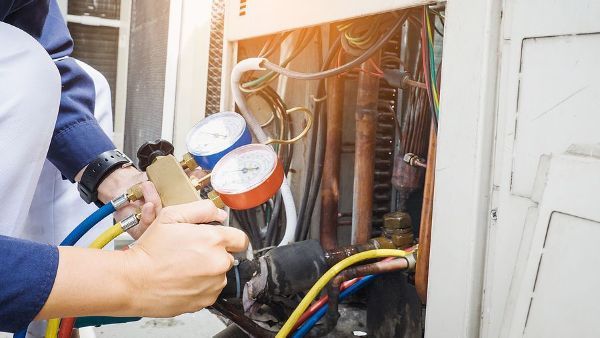HVAC contractor advice: solving airflow issues
Everything about A/c: Identifying Common Issues and Effective Air Conditioning Repair Methods
Heating and cooling systems are essential for preserving indoor convenience. Understanding their components and functionality is vital for determining common problems. Home owners often face issues such as ineffective air conditioning, unusual smells, or increasing power prices. These indications can show underlying concerns that may call for interest. Discovering do it yourself troubleshooting methods can be valuable, however knowing when to seek professional assistance is similarly crucial. What actions can be required to guarantee durable efficiency?
Recognizing Your Cooling And Heating System: Components and Functionality
A cooling and heating system, usually thought about the backbone of interior climate control, contains numerous essential components that interact to manage temperature level and air quality. The key elements consist of the home heating device, ventilation system, and a/c system. The home heating unit, normally a furnace or central heating boiler, generates heat during colder months, while the cooling system cools down interior areas during the summer season.

Common A/c Troubles Property Owners Encounter
Homeowners commonly deal with numerous common cooling and heating troubles, including inconsistent temperature distribution throughout their living spaces. In addition, uncommon sounds during procedure can indicate underlying issues that call for interest. Resolving these problems quickly is necessary for keeping ideal system efficiency.
Inconsistent Temperature Circulation
Lots of houses experience the aggravating concern of inconsistent temperature level distribution, where particular rooms feel uncomfortably cozy while others remain as well cold. This issue usually arises from a range of aspects, consisting of bad insulation, blocked vents, or an incorrectly sized cooling and heating system. When air ducts are not appropriately secured or when furnishings blocks air flow, some rooms may obtain insufficient air conditioning. Additionally, thermostat placement can substantially influence temperature level law; a thermostat located in a sunlit area might misstate the total temperature level of the residence. Routine upkeep, consisting of cleaning filters and guaranteeing ductwork is clear, can help relieve these inconsistencies. Home owners might additionally consider zoning systems to better control temperatures throughout different areas of the home, promoting an extra comfy living environment.
Unusual Sounds During Procedure
When a HVAC system runs, uncommon sounds can suggest underlying problems that call for focus. House owners may run into a series of noises, such as grinding, squeaking, or hissing. Grinding sounds frequently signify damaged bearings or elements, while squealing can recommend loose belts or parts requiring lubrication. Hissing might indicate a cooling agent leak, which can jeopardize the system's performance. In addition, banging noises may indicate loose ductwork or an issue with the blower fan. Each of these noises works as a caution, triggering home owners to investigate additionally. Disregarding these indications can cause even more substantial issues and costly repair services. Regular maintenance and timely focus to unusual noises can boost system longevity and performance, making certain a comfortable living setting.
Indications That Indicate Your Air Conditioning Needs Repair Service
Just how can one tell if their a/c unit needs repair service? Several indications might suggest underlying issues needing expert attention. Initially, if the air conditioning stops working to cool down the room efficiently, it might recommend a cooling agent leak or compressor malfunction. In addition, an increase in power costs without matching usage changes could signify ineffectiveness in the system. Property owners need to additionally be sharp to uncommon smells emanating from the system, which can indicate mold and mildew development or electric concerns. Additionally, if the a/c frequently cycles on and off, it could be an indicator of a malfunctioning thermostat or other mechanical problems. Ultimately, the presence of water pooling around the system can suggest a stopped up drainpipe line. Acknowledging these signs early can save money and time, making certain that the air conditioning system operates effectively and effectively.
DIY Troubleshooting Techniques for Cooling And Heating Issues
When facing HVAC issues, property owners can use several do it yourself fixing techniques to recognize the trouble. Trick approaches include examining thermostat settings, inspecting air filters, and evaluating water drainage concerns. These steps can assist pinpoint usual breakdowns prior to looking for expert help.
Examining Thermostat Setups
What webpage steps should homeowners require to ensure their thermostat setups are right? Initially, they should validate the thermostat is set to the preferred temperature level and mode, whether home heating or air conditioning. Looking for a clear display and validating the thermostat is not set to "hold" or "trip" setting is crucial. Property owners need to additionally verify that the thermostat is degree and set up in an area devoid of drafts, direct sunlight, or other temperature affects. Additionally, rectifying the thermostat can help provide accurate analyses. If the thermostat operates batteries, changing them might resolve any problems. By systematically examining these elements, homeowners can often recognize and correct thermostat-related problems, advertising suitable HVAC system performance.
Inspecting Air Filters
Air filters play a crucial role in maintaining excellent cooling and heating efficiency. They trap dust, irritants, and other fragments, guaranteeing clean air flow. In time, filters can become clogged up, minimizing air movement and effectiveness. To check air filters, individuals must first situate the filter, commonly discovered in the return air duct or near the heater. As soon as located, they ought to assess the filter's problem-- if it shows up dirty or tarnished, it most likely requirements replacement. A lot of filters require transforming every 1-3 months, relying on usage and ecological variables. Regular examination and timely replacement of air filters not only boost air quality but likewise lengthen the life expectancy of a/c systems, protecting against prospective breakdowns and costly repair services.
Examining Drain Issues
Just how can homeowners efficiently recognize and deal with drain concerns within their HVAC systems? They ought to check the condensate drainpipe line for obstructions or clogs, which can lead to water accumulation. Homeowners might utilize a wet/dry vacuum cleaner to remove any type of particles blocking the line. Next, checking the drain frying pan for rust or leakages is crucial, as a harmed frying pan can trigger water to overflow. Routine cleaning of the drain line with a mixture of vinegar and water assists avoid future blockages. In addition, ensuring appropriate slope of the drain line advertises efficient water flow. If these do it yourself strategies do not resolve the problem, getting in touch with an expert heating and cooling technician may be essential to stay clear of potential water damages and system failing.
When to Call an Expert for A/c Repair Services

While some official source air conditioner problems can be dealt with via do it yourself techniques, there are circumstances where calling a professional ends up being vital. House owners should look for expert aid when they run into persistent troubles, such as insufficient cooling, strange noises, or uncommon odors rising from the unit. These signs and symptoms may suggest much deeper problems that require specialized knowledge and devices to identify and repair correctly.

Preventative Maintenance Tips for A/c Longevity
Normal preventative maintenance can substantially improve the durability of HVAC systems. House owners should arrange annual evaluations by certified specialists to evaluate system effectiveness and determine prospective concerns. Frequently transforming or cleaning up air filters is necessary, as this assurances proper air flow and lowers stress on the system. Furthermore, examining and sealing ductwork protects against energy loss and boosts general performance.
It is likewise a good idea to keep the exterior system clear of particles and greenery, allowing for peak air flow and heat exchange. Home owners need to examine the condensate drain for blockages to avoid water damage and mold and mildew growth. Keeping appropriate thermostat settings and using programmable choices can boost power effectiveness. Recording upkeep tasks assists track service history and can help in identifying persisting concerns. By following these preventative actions, people can maximize the efficiency and life expectancy of their HVAC systems
Often Asked Concerns
Exactly how Usually Should I Replace My A/c System Filters?
A/c system filters should normally be changed each to 3 months, depending upon usage, filter type, and ecological elements. Normal substitute helps preserve efficiency and air quality, making sure peak system performance throughout the year.
What Dimension A/c System Do I Required for My Home?
To figure out the suitable heating and cooling system size for a home, one should consider square footage, insulation high quality, and regional climate. Consulting a professional can aid assure maximum performance and convenience for the particular living space.
Are There Eco-Friendly HVAC Options Available?
Yes, environment-friendly HVAC options are available, consisting of energy-efficient warm pumps, solar-powered systems, and geothermal home heating. These choices reduce power consumption and environmental effect, promoting sustainability while maintaining reliable climate control for household and business rooms.
Just How Can I Improve My heating and cooling System's Energy Efficiency?
To improve cooling and heating energy effectiveness, one can routinely preserve the system, seal air leakages, set up programmable thermostats, utilize energy-efficient filters, and assurance sufficient insulation throughout the home to minimize power intake and improve performance.

What Is the Ordinary Life Expectancy of an A/c System?
The ordinary lifespan of a HVAC system generally varies from 15 to 25 years, depending upon aspects such as upkeep, use, and the top quality of installment. Routine upkeep can greatly prolong its operational long life.
Final thought
In recap, a detailed understanding of heating and cooling systems equips property owners to determine common issues and address small problems effectively. Recognizing indicators of malfunction, employing do it yourself repairing techniques, and focusing on routine maintenance can boost system performance and performance. When faced with intricate repairs, employing expert help is vital to ensure safety and security and durability. By cultivating recognition and aggressive care, people can enjoy a comfortable indoor helpful site atmosphere while minimizing unexpected prices connected with a/c failings.